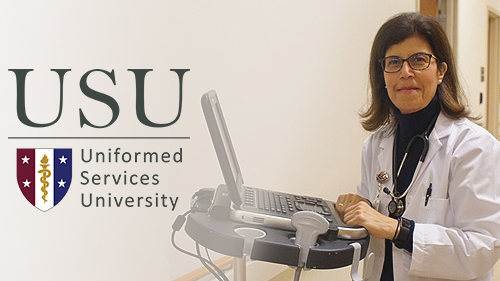USU professor develops self-diagnosis, treatment kit for common female infections
By USU External Affairs
Women serving in the U.S. military may soon have access to a symptom self-diagnosis and self-treatment kit used for common urogenital infections while deployed overseas or in austere environments.
Daniel K. Inouye Graduate School of Nursing.“In the most recent campaigns in Afghanistan and Iraq, sex-specific common urogenital infections were one of the top five reasons female warfighters sought medical care, as well as one of the top seven reasons they were flown out of theater in need of a higher echelon military treatment facility — oftentimes requiring in-patient hospitalization and treatment,” said Kostas-Polston, the study’s senior principal investigator. “In today’s military, it is unacceptable for female warfighters who are experiencing symptoms consistent with common urogenital infections to go under- or undiagnosed and untreated.”
Kostas-Polston added delays or missed diagnoses can lead, and have led, to more severe health issues which can be avoided.
“Our goal is to develop a urogenital health kit for use in austere environments by our female warfighters to enhance personal health and wellness, thereby enhancing warfare capability,” said Kostas-Polston. “With the proper education and training, our nation’s female warfighters can, with privacy and dignity, self-test, identify, and treat such infections.”
Extracting female warfighters and flying them from, for example, Iraq to Germany, for a common urogenital infection that could have been addressed by the woman herself without any interruption in her service is “unthinkable,” according to Kostas-Polston.
Currently, women make up about 19 to 20 percent of the U.S. military. Kostas-Polston said there are DOD plans to extend that number to 25 percent.
Funding for her seven-study program of research comes from a variety of sources, including USU’s Military Women’s Health Consortium. Kostas-Polston and her team are currently conducting their seventh and final study, a Food and Drug Administration (FDA) clinical trial. The clinical trial was designed to test the validity and reliability of a diagnostic point-of-care device for vaginal yeast. Upon receiving FDA clearance, the device will be incorporated into the urogenital health kit.
Currently, recruitment and data collection is underway at Landstuhl Regional Medical Center and Womack Army Medical Center. According to Kostas-Polston, her research has shifted the understanding that the most austere environments are often not found while female warfighters are on deployments — but rather during field training. She said they found that in deployed settings military leaders prepare for and have their teams logistically account for the provision of water, sanitation, and hygiene resources, which may not be the case during field training.
“Our research has shifted the discussion from ‘deployment’ to ‘austerity of environment’ and we find in austere environments there is varying availability of water, sanitation, and hygiene resources,” said Kostas-Polston. “Water, sanitation, and hygiene resource-limited austere environments necessarily bring about changes in female warfighters’ hygiene practices and behaviors, which in turn increase risk for urogenital infections.”
Kostas-Polston’s goal is to receive both FDA clearance and DOD approval in the next few years. Her program of research addresses how to self-identify, confirm, and treat the three most common urogenital infections reported by female warfighters, including urinary tract infections, bacterial vaginosis, and vulvovaginal candidiasis or vaginal yeast infections.
In the United States, there are currently two diagnostic point-of-care tests for only two of the urogenital infections addressed in her study. She said there is no FDA-approved diagnostic point-of-care device for vulvovaginal candidiasis.
Kostas-Polston said she is working to gather the data needed to establish the sensitivity, specificity, and positive and negative predictive values of the diagnostic point-of-care device for vaginal yeast. Data from her team’s clinical trial as well as six other studies will be compiled into a formal, FDA 510(k) submission. Once approved for use, her team plans to develop the final prototype kit and test it in the field with operational female warfighters.
“Our proposed kit can be used independently by female warfighters and will be valid and reliable in almost all austere environments across the globe,” she said.
Kostas-Polston's team is made up of about 45 nurse scientists, physicians, pharmacists, microbiologists, and clinical staff who are working throughout the world to support the project’s research.
“It is a big job,” she said, adding the next step in the process is to get the vaginal yeast test approved by the FDA in the very near future. “If it is approved it will be the first infectious disease diagnostic point-of-care device approved in the United States by the FDA Medical Device Division – and it will be so important to our military women.”







